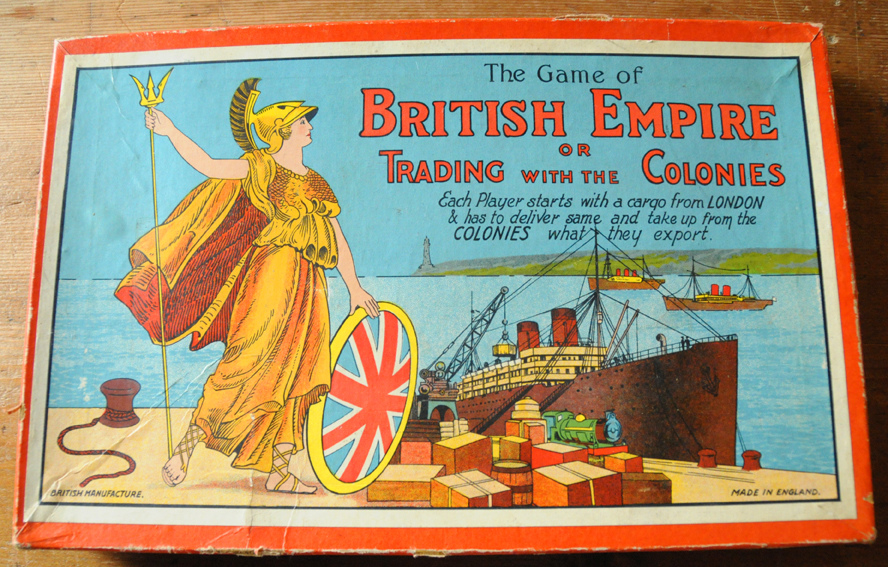 The Game of British Empire, or Trading with the Colonies, c. 1914-1930
The Game of British Empire, or Trading with the Colonies, c. 1914-1930 Conference: The Colonial Legacy Conference - on the occasion 300th anniversary of the De Vrede van Utrecht
In 2013, the city of Utrecht is commemorating the 300th anniversary of the signing of the De Vrede van Utrecht, The Treaty of Utrecht. This treaty marked the end of almost two centuries of (religious) wars and conflicts in Europe, and its colonies in Africa, Asia and the Americas. The Treaty of Utrecht is rightly considered as an important marker in European and even world history. Paradoxically however, many social-cultural historical aspects of the treaty are still relatively under-researched.
This is especially true for the aspect of the Treaty of Utrecht that concerned negotiation between various European countries about their overseas colonies. During the negotiations, it was agreed that Great-Britain received asiento: the right to deliver slaves to the Spanish for a period of thirty years, with which British slave traders and smugglers got access to the traditionally closed Spanish markets in the Americas. This human ‘merchandise’ was shipped to the Spanish and British colonies in the ‘New World’.
As the year 2013 not only commemorates the signing of the Treaty of Utrecht in 1713, but also marks the 150th anniversary of the abolition of slavery by the Dutch in 1863, the Colonial Legacy Conference aims to shed a new light on these crucial dates in European and Dutch history. The conference will examine the colonial and post-colonial heritage of the Treaty of Utrecht. It will also assess its legacy in contemporary scholarship on human trafficking, in the study of cultural memories of historical traumas, in practices of reconciliation and in popular culture.
The Colonial Legacy Conference links the commemoration of the Treaty of Utrecht in 1713, to the abolition of Slavery by the Dutch in 1863. Over the course of two days, distinguished academics such as Paul Gilroy, Achille Mbembe and Catherine Hall will delve into the legacy of the Treaty of Utrecht, the history of slavery, the state of slavery today and the connections between them. The conference will take you from history and philosophy, to anthropology and post-colonialism, transnational memories and transitional justice. In a great number of interdisciplinary lectures and panels, scholars will examine the lasting legacy of slavery and the persistent presence of human trafficking in the contemporary world. This programme is brought to you in collaboration with Utrecht Province, Treaty of Utrecht Foundation, the Royal Netherlands Academy of Arts and Sciences, the Descartes Centre, the University Research Focus Area Cultures & Identities and the Research Institute for History and Culture.
Speakers
Rutvica Andreijasevic
Kevin Bales
Elazar Barkan
Rosi Braidotti
Esther Captain
Jolle Demmers
Paulla Ebron
Philomena Essed
Patrick Eyres
Paul Gilroy
Catherine Hall
Achille Mbembe
Wijnandt Mijnhardt
Geert Oostindie
Maarten Prak
Ann Rigney
Michael Rothberg
Francoise Vergés.
Documentation
Video registrations of the conference can be found here.
Partners
This programme is brought to you in collaboration with Utrecht Province, Treaty of Utrecht Foundation, the Royal Netherlands Academy of Arts and Sciences, the Descartes Centre, the University Research Focus Area Cultures & Identities and the Research Institute for History and Culture.
Exhibition
The exhibition BOMB (2013), at the Museum of Contemporary Aboriginal Art – AAMU, Utrecht, the Netherlands, is an artistic exploration of nationalism, racism and discrimination in Australia; it is also part of the cultural program on the commemoration of the 300th anniversary of the Vrede van Utrecht (Treaty of Utrecht, 1713).
Colonial history / Slavery /
Network
Françoise Vergès
Activist, Writer

